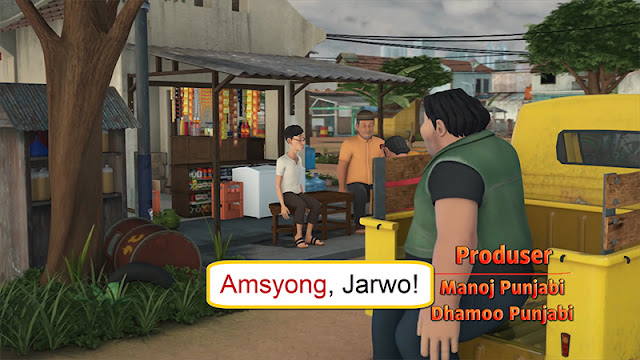- Get link
- X
- Other Apps
Posted by
Iman Prabawa
on
- Get link
- X
- Other Apps
Halo semuanya. Apa kabar? Ketemu lagi dengan saya, Iman Prabawa. This time, I want to talk about the meaning of the word [amsyong]. This word is considered a slang term, and as always, we will watch scenes from movies where the word [amsyong] is spoken.
If you are a beginner in the Indonesian language, you can learn step by step with My Lesson Here.
So, without further ado, let's talk about it.
Meaning of Amsyong
[Amsyong] is considered [bahasa gaul] or a slang term. When you say amsyong, it means that you are so unlucky. Something bad has happened to you. Or something that is not good for you.
How to Pronounce Amsyong
Here is how you pronounce [amsyong] in bahasa Indonesia.
Next, we will watch examples, mostly from movies where the word [amsyong] is used by Indonesians.
Examples of Amsyong In Use
In this section, I will gather examples from movies, videos, comics, and everything else where the word [amsyong] is spoken so you can learn how to use it correctly in the right context.
The first example we are about to watch is from a movie called Filosofi Kopi (2015). Let's watch the scene below.
In this clip, he says:
Amsyong banget dah punya bapak!
Which translates to English as:
I'm so unlucky to have a father like him!
The second example is taken from Adit & Sopo Jarwo (2022), an Indonesian animation movie. Let's watch the clip below.
In this clip, he says:
Amsyong, Jarwo!
Which translates to English as:
This is not good, Jarwo!
The third example is taken from a movie called Teka Teki Tika (2021). Let's watch the clip below.
In this clip, you hear him say:
Menurut lu, amsyong ngga?
Which translates to English as:
Do you think this is not bad?
The fourth example is taken from Marcel's YouTube channel. Let's watch the clip below.
In this clip, you hear the word [amsyong] being spoken in this sentence.
Pokoknya yang apes, amsyong.
Which translates to English as:
The point is, the unlucky ones will be damned.
You can watch all the clips without the black screen on my Buy Me a Coffee post. I also provided the captions in Indonesian with English translations and vocabulary explanations so you could understand them better. You can also download all the clips there. I explain this on my About Me page.
So, I guess that is going to wrap up for now. Thank you for reading this article, and if you have any questions, just leave them in the comment section down below, and I'll be happy to answer them for you.
Read also: Jadi Ngga Enak Meaning In Bahasa
If I find another scene where the word [amsyong] is spoken, Insha Allah, I will update this article again. I'll see you soon. Bye now.
Location:
Jakarta, Indonesia
- Get link
- X
- Other Apps
Hello, I'm Iman Prabawa a.k.a Pak Guru Iman. I love to share about languages. My Instagram, @iman_prabawa

Comments
Post a Comment